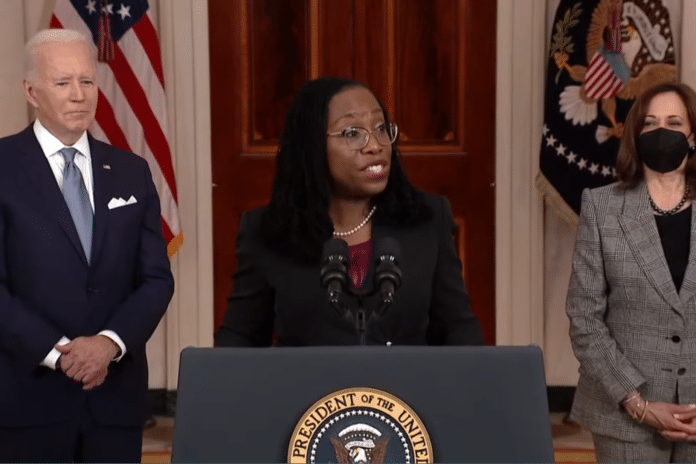
With all that’s going on in the world, it may be overlooked that Supreme Court confirmation hearings for Judge Ketanji Brown Jackson commence on Monday.
Debates about her questionable knowledge, aberrant views, and just eight months in her current position on the Court of Appeals will barely be mentioned amid the canonization by legacy media.
Seconds after Jackson’s nomination was made public last month, Senate Judiciary Committee Chairman Dick Durbin demanded a quick confirmation and spoke of her “extraordinary life story.”
But this statement is not remotely true.
“I don’t see the superstar. She only had a couple of noteworthy opinions,” Constitutional Law professor Josh Blackman told the Washington Examiner. “I didn’t hear her giving any sort of influential speeches. She didn’t really write articles. There wasn’t much that distinguished her. I mean, nothing. That’s not a criticism. It wasn’t bad, but it just wasn’t that she was the greatest thing in the world.”
What can we expect from Judge Ketanji Brown Jackson? https://t.co/wCikV4JrgO via @TreyDimsdale #SCOTUS #KetanjiBrownJackson
— Acton Institute (@ActonInstitute) March 16, 2022
I’ve long said Justice Sandra Sotomayor was and is the least qualified justice of my lifetime, but at least she overcame being mostly raised by a single mother in a New York City tenement.
Jackson, on the other hand, led a life of comfort, at least akin to Justices Elena Kagan or Brett Kavanaugh.
Yes, Jackson would be the first black woman to serve as a Supreme Court justice. So what?
A black woman served as secretary of state; a half-black woman is serving as vice president; a black man recently served two terms as president; and the least racist nation on earth has seen many black men and women in its highest offices, including the Supreme Court.
No, Jackson’s background is exactly what you would expect of a high court nominee.
Her father was a top-level lawyer and her mother ran an elite high school. Both are college graduates, unlike nearly 80% of Americans in their generation. She surely didn’t grow up in the ghetto; she served as class president at the same high school that produced Jeff Bezos and U.S. Surgeon General Vivek Murthy. Jackson then moved on to, yes, Harvard University.
Jackson spent seven years at America’s most famous university, serving as editor of the law review, like all other justices. A woman of the left, she even clerked for Justice Stephen Breyer, the man she’s set to replace on the bench.
“She is as ordinary a nominee possible,” a Minneapolis lawyer told Alpha News. “She has a résumé that looks like many Supreme Court nominees, but she lacks their experience and has been overturned in several important decisions. Jackson is a product of the ruling class and its ideology. Her race is irrelevant.”
Guess which justice’s biography looks the least like Jackson’s?
Clarence Thomas, who was raised by his grandparents in rural Jim Crow poverty, and yet, despite the abhorrent efforts of then-Sen. Joe Biden, became one of the most consequential jurists of his generation.
Most people, black or white, who grew up in an educated, nuclear family, attended the best schools, and met all the right people along the way — including her surgeon husband — are likely to soar to the top of their profession.
While the left hopes for a fight, this nomination is not a hill for Republicans to die on, since Democrats have the necessary votes and any legitimate questions toward Jackson will be deemed bigoted; facts still matter, though, even if the zeitgeist disagrees.
A.J. Kaufman
A.J. Kaufman is an Alpha News columnist. His work has appeared in the Baltimore Sun, Florida Sun-Sentinel, Indianapolis Star, Israel National News, Orange County Register, St. Cloud Times, Star-Tribune, and across AIM Media Midwest and the Internet. Kaufman previously worked as a school teacher and military historian.
















